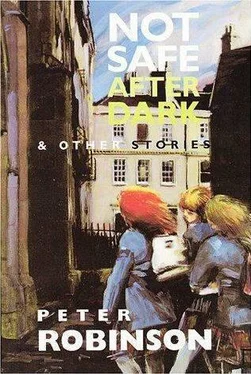Well, yes he had. He’d been worried. During the time with Maggie, he had been under a lot of stress at work, drinking too much as well, and he hadn’t been able to get it up. So what? Happens to everyone. And she’d wanted it like that, too, the rough way. Putting his hands around her throat had been her idea, something she’d got from a kinky book she’d read, and he’d gone along with her because she told him it might cure his impotence. Now she made the whole sordid episode sound much worse than it had been. She also admitted she had been just eighteen at the time, as well, and, as he remembered, she’d said she was twenty-three.
Besides, he had been impotent and violent only with Maggie. They could have brought on any number of other women to testify to his gentleness and virility, though no doubt if they did, he thought, his promiscuity would count just as much against him. What did he have to do to appear as normal as he needed to be, as he had once thought he was?
The witnesses for the prosecution all arose to testify against Reed like the spirits from Virgil’s world of the dead. Though they were still alive, they seemed more like spirits to him: insubstantial, unreal. The woman from the bridge identified him as the shifty-looking person who had asked her what time the schools came out; the Indian waiter and the landlord of the pub told how agitated Reed had looked and acted that evening; other people had spotted him in the street, apparently following the murdered girl and her friend. Mr Hakim was there to tell the court what kind of videos Reed had rented lately – including School’s Out – and even Bill told how his colleague used to make remarks about the schoolgirls passing by: ‘You know, he’d get all excited about glimpsing a bit of black knicker when the wind blew their skirts up. It just seemed like a bit of a lark. I thought nothing of it at the time.’ Then he shrugged and gave Reed a pitying look. And as if all that weren’t enough, there was Maggie, a shabby Dido, refusing to look at him as she told the court of the way he had abused and abandoned her.
Towards the end of the prosecution case, even Reed’s barrister was beginning to look depressed. He did his best in cross-examination, but the damnedest thing was that they were all telling the truth, or their versions of it. Yes, Mr Hakim admitted, other people had rented the same videos. Yes, he might have even watched some of them himself. But the fact remained that the man on trial was Terence J. Reed, and Reed had recently rented a video called School’s Out , the kind of thing, ladies and gentlemen of the jury, that you wouldn’t want to find your husbands or sons watching.
Reed could understand members of the victim’s community appearing against him, and he could even comprehend Maggie’s hurt pride. But why Hakim and Bill? What had he ever done to them? Had they never really liked him? It went on and on, a nightmare of distorted truth. Reed felt as if he had been set up in front of a funfair mirror, and all the jurors could see was his warped and twisted reflection. I’m innocent, he kept telling himself as he gripped the rail, but his knuckles turned whiter and whiter and his voice grew fainter and fainter.
Hadn’t Bill joined in the remarks about schoolgirls? Wasn’t it all in the spirit of fun? Yes, of course. But Bill wasn’t in the dock. It was Terence J. Reed who stood accused of killing an innocent fifteen-year-old schoolgirl. He had been in the right place at the right time, and he had passed remarks on the budding breasts and milky thighs of the girls who had crossed the road in front of their office every day.
Then, the morning before the defence case was about to open – Reed himself was set to go into the dock, and not at all sure by now what the truth was – a strange thing happened.
Bentley and Rodmoor came softly into the courtroom, tiptoed up to the judge and began to whisper. Then the judge appeared to ask them questions. They nodded. Rodmoor looked in Reed’s direction. After a few minutes of this, the two men took seats and the judge made a motion for the dismissal of all charges against the accused. Pandemonium broke out in court: reporters dashed for phones and the spectators’ gallery buzzed with speculation. Amidst it all, Terry Reed got to his feet, realized what had happened, if not how , and promptly collapsed.
•
Nervous exhaustion, the doctor said, and not surprising after the ordeal Reed had been through. Complete rest was the only cure.
When Reed felt well enough, a few days after the trial had ended in uproar, his solicitor dropped by to tell him what had happened. Apparently, another schoolgirl had been assaulted in the same area, only this one had proved more than a match for her attacker. She had fought tooth and nail to hang onto her life, and in doing so had managed to pick up a half brick and crack the man’s skull with it. He hadn’t been seriously injured, but he’d been unconscious long enough for the girl to get help. When he was arrested, the man had confessed to the murder of Debbie Harrison. He had known details not revealed in the papers. After a night-long interrogation, police officers had no doubt whatsoever that he was telling the truth. Which meant Reed couldn’t possibly be guilty. Hence motion for dismissal, end of trial. Reed was a free man again.
He stayed at home for three weeks, hardly venturing out of the house except for food, and even then he always went further afield for it than Hakim’s. His neighbours watched him walk by, their faces pinched with disapproval, as if he were some kind of monster in their midst. He almost expected them to get up a petition to force him out of his home.
During that time he heard not one word of apology from the undertaker and the bible salesman; Francis still had ‘stuff to do… things to organize’; and Camille’s answering machine seemed permanently switched on.
At night Reed suffered claustrophobic nightmares of prison. He couldn’t sleep well and even the mild sleeping pills the doctor gave him didn’t really help. The bags grew heavier and darker under his eyes. Some days he wandered the city in a dream, not knowing where he was going, or, when he got there, how he had arrived.
The only thing that sustained him, the only pure, innocent, untarnished thing in his entire life, was when Debbie Harrison visited him in his dreams. She was alive then, just as she had been when he saw her for the first and only time, and he felt no desire to rob her of her innocence, only to partake of it himself. She smelled of apples in autumn and everything they saw and did together became a source of pure wonder. When she smiled, his heart almost broke with joy.
At the end of the third week, Reed trimmed his beard, got out his suit and went in to work. In the office he was met with an embarrassed silence from Bill and a redundancy cheque from Frank, who thrust it at him without a word of explanation. Reed shrugged, pocketed the cheque and left.
Every time he went into town, strangers stared at him in the street and whispered about him in pubs. Mothers held more tightly onto their daughters’ hands when he passed them by in the shopping centres. He seemed to have become quite a celebrity in his home town. At first, he couldn’t think why, then one day he plucked up the courage to visit the library and look up the newspapers that had been published during his trial.
What he found was total character annihilation, nothing less. When the headline about the capture of the real killer came out, it could have made no difference at all; the damage had already been done to Reed’s reputation, and it was permanent. He might have been found innocent of the girl’s murder, but he had been found guilty too, guilty of being a sick consumer of pornography, of being obsessed with young girls, unable to get it up without the aid of a struggle on the part of the female. None of it was true, of course, but somehow that didn’t matter. It had been made so. As it is written, so let it be. And to cap it all, his photograph had appeared almost every day, both with and without the beard. There could be very few people in England who would fail to recognize him in the street.
Читать дальше










![Джеймс Чейз - Not Safe to Be Free [= The Case of the Strangled Starlet]](/books/417649/dzhejms-chejz-not-safe-to-be-free-the-case-of-the-thumb.webp)

